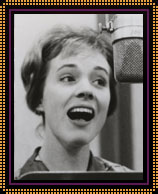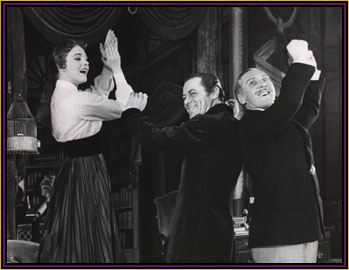 Singer and actress Julie Andrews has long been famed for her perfect pitch and impressive vocal range. From her 1954 Broadway debut as Polly in “The Boy Friend,” she has received rave reviews from critics and lasting devotion from music fans. Best known for her roles in stage and film musicals, including “My Fair Lady,” THE SOUND OF MUSIC, and MARY POPPINS, Andrews has concentrated in later years on acting on the screen rather than singing, appearing in husband Blake Edwards’ films, including S.O.B. and THAT’S LIFE.
Singer and actress Julie Andrews has long been famed for her perfect pitch and impressive vocal range. From her 1954 Broadway debut as Polly in “The Boy Friend,” she has received rave reviews from critics and lasting devotion from music fans. Best known for her roles in stage and film musicals, including “My Fair Lady,” THE SOUND OF MUSIC, and MARY POPPINS, Andrews has concentrated in later years on acting on the screen rather than singing, appearing in husband Blake Edwards’ films, including S.O.B. and THAT’S LIFE.
Andrews had a somewhat unusual childhood. Born Julia Elizabeth Wells on October 1, 1935, at Walton-on-Thames, England, her parents divorced when she was very young. Her mother, a pianist, married Edward Andrews, who sang in music halls, and the child took her stepfather’s last name. The newly made family traveled throughout England, Mr. and Mrs. Andrews performing for a living. Julie, as they called her, first began displaying her own considerable vocal talents during World War II, when she was about eight years old. While hiding in community air-raid shelters, Mr. Andrews led the frightened citizens in singing to keep spirits up. Mrs. Andrews began to notice that her daughter’s voice often rose far above those of even the men and women; when examined by a doctor, Julie’s vocal chords proved to have already developed to an adult level. As soon as they were able, the Andrewses provided their prodigy with professional singing lessons by Madame Stiles-Allen.
By the time Andrews was 12, she was performing in the same venues as her mother and stepfather; she made her professional singing debut with the “Starlight Roof” revue at the Hippodrome Theatre on London’s West End. But she was destined to go further than her parents. After performing in several other pantomimes, Andrews played the featured role in a pantomime of “Cinderella” in 1953, and in this capacity she caught the attention of director Vida Hope, who was working on the London production of Sandy Wilson’s musical about the 1920s, “The Boy Friend.” Hope brought this discovery to the United States to shine on Broadway, where she won rave reviews portraying Polly Brown, an earnest young British flapper. Critic John Beaufort asserted in the CHRISTIAN SCIENCE MONITOR that the young singer’s interpretation of the part was both “comic and adorable” and that “her solemnly pretty ingenue-ness” was “a triumph of controlled exaggeration”; Wolcott Gibbs agreed, calling Andrews “the season’s dramatic highlight” in the NEW YORKER. The New York version of “The Boy Friend” ran for 485 performances.
Andrews moved to an even bigger triumph in 1956, when she became the youngest actress ever to play the part of Eliza Doolittle professionally. She starred in the musical version of George Bernard Shaw’s “Pygmalion” — “My Fair Lady” — and in it warbled songs such as “Wouldn’t It Be Loverly” and “Just You Wait, Henry Higgins.” In this capacity Andrews garnered a nomination for an Antoinette Perry (Tony) Award and the New York Drama Critics Award for best actress in a musical. Despite her critically acclaimed performance, however, she was passed over for the film version in favor of actress Audrey Hepburn. Andrews received another Tony nomination in 1961 for her portrayal of Queen Guinevere in the smash Arthurian musical, “Camelot.”
Julie Andrews
- The Boy Friend
- Camelot
- My Fair Lady
- Victor/Victoria
- Oscar Hammerstein II
- Alan Jay Lerner
- Frederick Loewe
- Richard Rodgers
- Stephen Sondheim
- Tony Walton
Though Andrews was again passed over for the film version of “Camelot” — this time in favor of actress Vanessa Redgrave — her time in films was not long in coming. She made her screen debut in 1964 in MARY POPPINS. Her appearance as the magical nanny won her both an Academy Award and a Golden Globe Award for best actress. This film and the following year’s THE SOUND OF MUSIC, in which she played a children’s governess who wins the love of her charges’ father, began to establish Andrews as a specialist in wholesome family entertainment. As Clive Hirschhorn put it in his 1981 book, THE HOLLYWOOD MUSICAL, THE SOUND OF MUSIC was accused of “mawkish sentimentality” by many critics, but “it was Andrews’ extraordinarily assured and appealing central performance … that was largely responsible for the film’s enormous success.” Her featured songs in the film included the title theme, “I Have Confidence in Me,” and “My Favorite Things.”
Another musical film featuring Andrews was 1967’s THOROUGHLY MODERN MILLIE, which Hirschhorn hailed as “an irresistible mixture of brashness, charm, and nostalgia put together with expertise.” Like her first major stage play, MILLIE had Andrews portraying a young woman during the 1920s — a young woman who goes to New York City as a secretary in search of a rich husband and becomes involved in a white slavery ring. During what Hirschhorn describes as a “thoroughly captivating star performance,” Andrews sang ditties such as “Jimmy” and “Poor Butterfly.”
Not long after filming MILLIE, Andrews divorced her first husband, theatrical designer Tony Walton, and married motion-picture producer and director Blake Edwards, famed for his PINK PANTHER films. She began working in Edwards’ efforts, including 1970’s DARLING LILI. Andrews was also featured as actor Dudley Moore’s long-suffering girlfriend in Edwards’ 10. In 1981’s S.O.B., Edwards spoofed his wife’s wholesome image by making a big production of her character, Sally Miles, baring her breasts for the camera. Andrews perhaps moved even further from her former reputation when she portrayed a singing transvestite in Edwards’ 1982 motion picture, VICTOR/VICTORIA. The critics especially took her seriously in the latter role, and she received nominations for both an Academy Award and a Golden Globe for her part in the film.
During the late 1980s, Andrews concentrated on more serious film roles, ones that did not utilize her talent for singing. Though Edwards’ 1986 effort THAT’S LIFE is a comedy, Andrews’ portrayal of Gillian Fairchild is a serious one — Gillian is waiting for the results of a biopsy. Andrews “is the movie’s strong, quiet heart,” declared reviewer David Ansen in NEWSWEEK, “and it is she who devastates us when she finally unleashes her pent-up emotions.” Despite some negative comments about the film in general, critics tended to agree favorably about Andrews’ performance in DUET FOR ONE. Playing a famed violinist dying of multiple sclerosis, “Andrews doesn’t tear a passion to tatters; she uses it to stitch a coherent soul,” according to Richard Corliss of TIME. And MACLEAN’s critic Lawrence O’Toole asserted that “Andrews gives what may be the performance of her life in DUET FOR ONE.”
But Andrews continues entertaining fans with her voice. In 1988 she released the album LOVE, JULIE, which featured her renditions of songs like “Tea for Two,” “Come Rain or Come Shine.” Though PEOPLE reviewer David Hiltbrand considered the disc a mixed effort, he had praise for the “sensuousness to her tone,” and said that her voice was “sweet and clear, often frosted with an appreciable sparkle.”
Source: Excerpted from CONTEMPORARY MUSICIANS, VOLUME 4, Gale Research, © 1990 Gale Research. Reprinted by permission of The Gale Group.
Photo credits: Photofest and the New York Public Library


